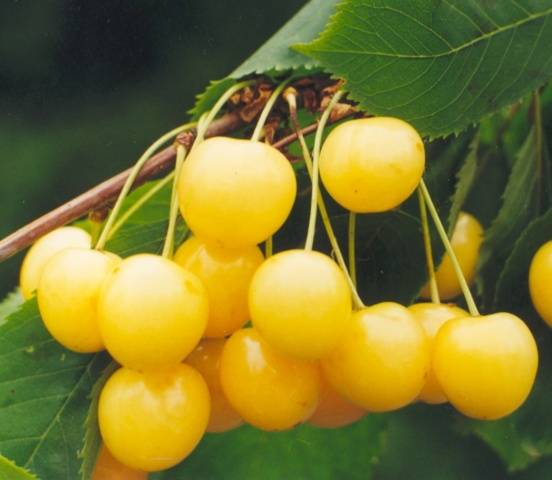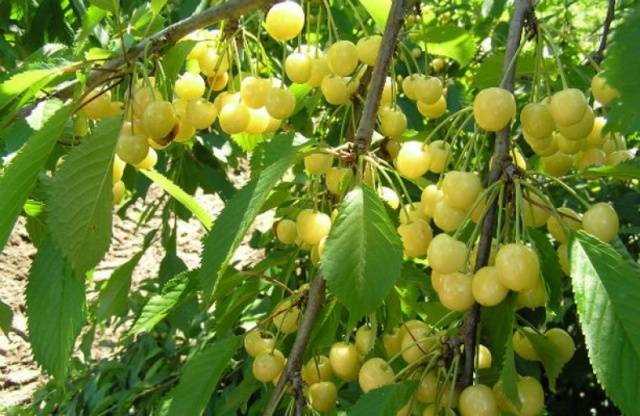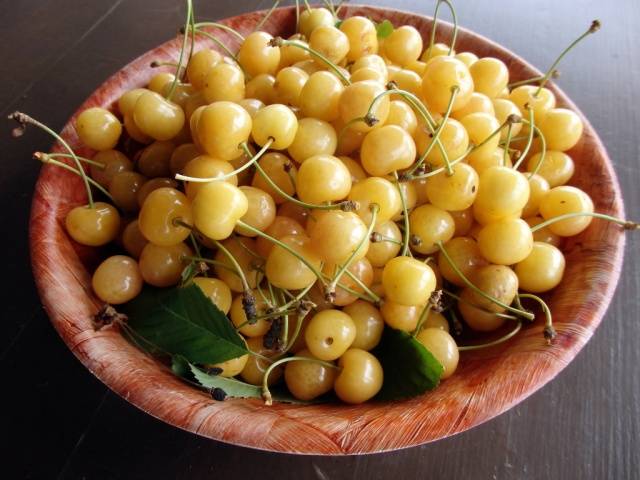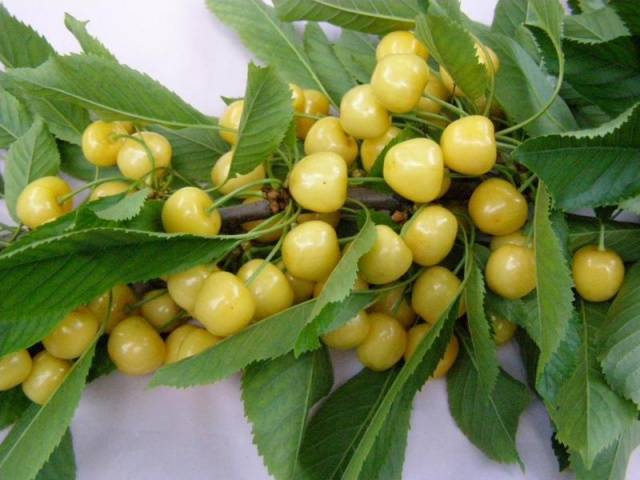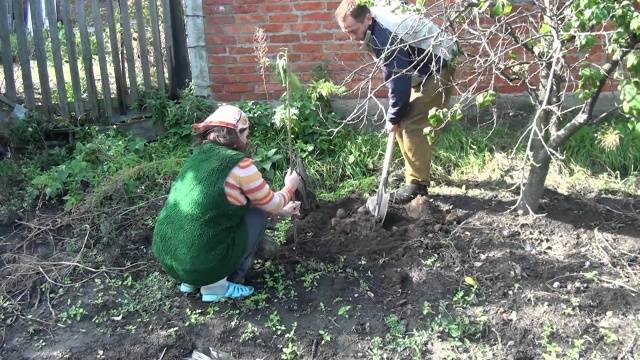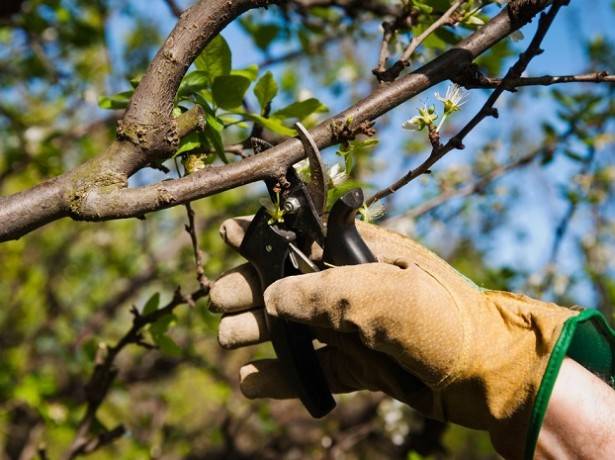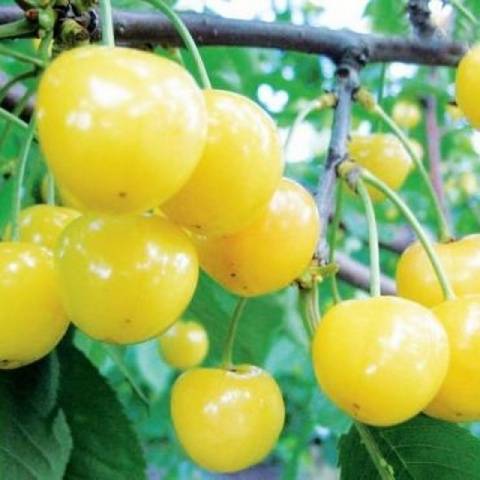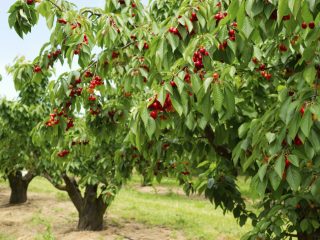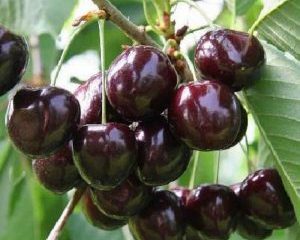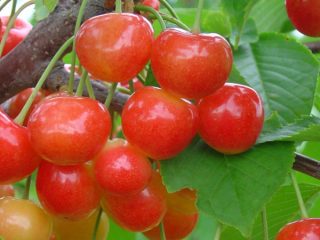Content
Cherry Chermashnaya - early yellow variety cherries... Many grow it on their plots precisely because of its early ripening.
Breeding history
This type of sweet cherry was artificially obtained from the seeds of the Leningrad yellow cherries through free pollination at the All-Russian Institute for the Cultivation of New Plant Species. Included in the state register since 2004 for the Central region of Russia.
Description of culture
The tree has an average height - up to 5 meters, grows quickly. The crown is round and oval of medium density. The main branches form straight and obtuse angles, which is often mentioned in the description of the Chermashnaya yellow cherry variety. Shoots are brownish-red. The size of the leaves is average, the shape is lance-oval with small notches and a pointed apex.
The berries of this cherry variety grow on branches in the form of bouquets and separately on some shoots. The fruits are yellow with a slight pink blush, round and medium-large, weighing from 3.8 to 4.5 g. These are medium-sized berries, if we compare the cherry varieties Chermashnaya and Bull's Heart, the berries of which reach 10 g.
The pulp is the same color as the peel - yellow, juicy, delicate in taste, there is practically no sourness. The stone lags behind the pulp very well, it is smooth to the touch.
This variety is good for the Central and Southern regions of Russia. But it should be borne in mind that the soil for planting should not be heavy. Sandy and loamy areas are considered the best.
Characteristics
The characteristic of the cherry variety Chermashnaya is distinguished by an early harvest. It can withstand cold weather and is less vulnerable to diseases and parasites than others.
Drought resistance, winter hardiness
The winter resistance of the variety is average, just suitable for the Moscow region. When measuring the degree of freezing of the bark, the sweet cherry received 1 and 2 points, which means good frost resistance of the Chermashnaya cherry. This species also tolerates drought well, in general it is a thermophilic tree.
Pollination, flowering period and ripening times
The first berries appear at the age of 3 years and by the end of June. Flowering begins before the leaves cover the tree. The flowers are white in color and in the shape of an umbrella with round petals.
Pollination of self-fertile Chermashnaya occurs through other trees. Varieties are better at this task. Raditsa, Shokoladnitsa, Crimean cherry and Fatezh.
Productivity, fruiting
The peak yield occurs in the 6th year after planting the seedling. Up to 30 kg of fruit can be harvested from one cherry. They do not ripen all at once, but in turns, but quickly, so the crop should be harvested in several stages. Up to 86 centners can be harvested from one hectare for the entire ripening period.
Scope of berries
The most common is, of course, eating fresh berries of this variety. Well early cherry Chermashnaya is stored for up to 4 days at an air temperature of +2 - +5 degrees and subject to the presence of a cutting. The berry can be kept in the freezer for no more than 4-5 months.
For transportation, you should also pick cherries with a handle in dry weather. The berry is suitable for canning (jams, compotes).
Disease and pest resistance
This variety is quite resistant to diseases caused by fungi and leaf-eating pests. But with improper care, the plant can get sick and even die.
Advantages and disadvantages
The advantages include, first of all, the excellent sweet taste of cherries, early ripening of fruits, stable at a high level of productivity and early maturity, as well as sufficient resistance to frost and pests. Of the shortcomings, the main and important factor is self-infertility.
Landing features
Before planting a young seedling, several important points should be completed: find the ideal place, treat the area with fertilizers, and so on.
Recommended timing
Planting young cherries is recommended by experts in early spring. This is worth remembering when growing Chermashnaya cherries, despite the high frost resistance of the variety.
Choosing the right place
A site with good air flow and normal access to sunlight would be ideal, but not low-lying. The soil is recommended to be loose with good moisture permeability, no closer than 1.7 m to the groundwater. Dense soils are categorically not suitable: peat, sand, clay. The acidity of the soil should not exceed pH 6.5.
What crops can and cannot be planted next to cherries
Nearby, you can plant varieties of pollinators for cherries Chermashnaya, for example, cherries, it will act as a pollinator, like other types of cherries. Stone berry trees require separate planting from other fruit varieties. It is not recommended to plant it near bushes. Also, cherries can ruin an apple tree in close proximity.
Selection and preparation of planting material
Some growers cut the tips of thick roots just before planting in the ground.
It is best to buy seedlings from nurseries and specialty stores.
What you should first of all pay attention to when choosing planting material of the variety of yellow cherry Chermashnaya:
- Roots. They should not be frozen or dry.
- Root length not less than 25 cm.
- The presence of a sufficient number of fibrous roots.
- Sectional white root.
- Check for growths and swellings on the roots of cancer.
- The trunk of a young plant should have a smooth, intact texture.
- The ideal age of the seedling is 2 years.
- Leaves. If present, the plant may be dehydrated.
- If the root is in the ground, you need to make sure that it is in order.
Landing algorithm
First of all, you need to prepare a landing site. This should be a depression of about 90x90x90 cm. A small embankment must be left at the bottom; a support is nailed down at a short distance from the middle. Next, the seedling is covered with earth.
After falling asleep with earth, you need to stamp it lightly with your foot and make a side in a circle at a distance of 25 cm from the seedling. At the end, be sure to water the young cherries with enough water (about 3 buckets). Compost, ash or peat can be added to the embankment.
Follow-up care of the culture
As well as planting and caring for Chermashnaya cherries must be proper. Before the tree enters the fruiting season in the first years, 1/5 of all shoots should be cut off. You can fertilize cherries in the fall with superphosphates. The calculation is about 2-3 tablespoons per 1 sq. m crown projection and water abundantly.
Diseases and pests, methods of control and prevention
| Disease | Control methods | Prophylaxis |
| Moniliosis or gray rot | Cut off affected branches Treatment with Hom or copper chloride solution | Digging up a near-tree site in the fall Drying the soil Wood processing with urea 5% |
| Brown leaf spot | Copper sulfate treatment, Bordeaux liquid 1% | Cleaning of affected areas of a tree and fallen leaves, treatment with solutions |
| Clasterosporium disease | Treatment with Nitrafen and Bordeaux liquid | Cleaning fallen leaves in autumn |
| Pest | Way to fight | Prophylaxis |
| Cherry aphid | Wood processing with Aktellik and Fitaverm or Inta-vir | Cleaning fallen leaves and digging the ground under cherries |
| Cherry tube runner | Spraying with Chlorophos, Metaphos, Actellic and Corsair | Caring for the undercrown zone |
| Slimy cherry sawfly | Treatment with solutions (Karbofos, Iskra DE and M, Decis) | Urea treatment 3% and soil care |
Conclusion
In conclusion, it should be said that Chermashnaya cherry is an excellent variety of early ripening and early cherries. It is unpretentious and resistant to different weather, and its fruits have excellent taste.
Testimonials
Below are a few reviews of summer residents about the Chermashnaya cherry in the Moscow region.
